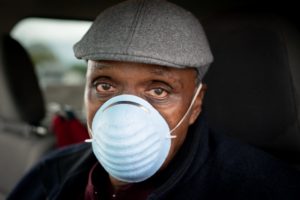It’s a good day when Shakur Buni manages to get three fares a day as a taxi driver.
Since Santa Clara County has ordered residents to stay at home to prevent the spread of the coronavirus, rides have dwindled for taxi drivers in San Jose. The number of taxi trips at the Mineta San Jose International Airport has declined by about 90 percent since March 17, according to nonprofit Taxi San Jose operations manager Gasim Rahma.
Many taxi drivers like Buni wait up to five hours just to get a customer.
“San Jose airport is like a ghost town,” he said.
Buni, who immigrated from Somalia to San Jose in 1989, has to support his wife and three children. As an independent contractor, Buni doesn’t receive benefits from his employer. He risks getting coronavirus as he continues to work during the public health crisis. But he has no other option.
“I have bills to pay. I have a family to feed,” he said.
The pandemic is causing a ripple effect in the taxi industry as the management staff of taxi companies also face a grim reality. To cut expenses, Green Cab has reduced its employees’ work hours. On March 30, San Jose airport officials sent a letter to Taxi San Jose, suspending its contract to operate the dispatch services at the airport until further notice. Yellow Checker Cab co-owner Larry Silva isn’t sure how long the firm can hold out before he is forced to make cuts.


The situation is just as dire for rideshare drivers.
Driving for Uber and Lyft is Nancy Kim’s only income. With a son to support and a monthly rent of $2,700, she struggles to make ends meet. Kim, a San Jose resident, drives 10 hours a day and typically makes about $250. Since the shelter in place order went into effect, she has seen her daily pay drop by more than 300 percent to about $60.
More than 75 percent of drivers saw demand and earnings drop from March 13 to March 16, according to a nationwide poll of Uber and Lyft drivers done by the Rideshare Guy blog.
To reduce the risk of drivers contracting coronavirus, Uber and Lyft have suspended their carpooling services. Both companies are working to provide drivers with disinfectants, according to their websites.
For many drivers, however, the companies’ efforts fall short of their needs.
Lyft hubs have temporarily closed across the country. Even though several closed hubs in some locations are still offering free sanitizing products for drivers, the offices in the Bay Area including San Jose “do not have sanitizing products,” according to the company website.
Edan Alva realized that driving for Lyft just wasn’t worth it anymore. He was devoting more time and money on searching for and buying disinfectants. Alva had depended on driving for Lyft as his main source of income for the last year and a half, ever since he lost his job in San Jose as a global security operation center manager at PayPal. But he was earning well below minimum wage driving for Lyft during the coronavirus outbreak. On March 27, Alva stopped driving for Lyft.
“I have the fortune of getting some friends and family support,” said Alva, who is a driver leader with San Jose-based advocacy group Gig Workers Rising.
Even though Uber and Lyft are offering up to 14 days of financial assistance for drivers diagnosed with coronavirus, Chris Chandler, driver advocate of labor group Rideshare Drivers United (RDU), said the policy is “woefully inadequate.”
Drivers who get coronavirus may not be able to receive their diagnosis. Given how difficult it is to receive testing for coronavirus, only a small number of drivers would actually be eligible for the program. That’s why paid sick leave and temporary disability insurance are crucial for independent contractors like Uber drivers, Chandler said.


The federal government’s $2 trillion stimulus package comes as a much-needed reprieve for gig workers.
President Donald Trump signed the Coronavirus Aid, Relief, and Economic Security (CARES) Act on March 27. Along with providing a one-time direct payout of up to $1,200 for most American adults, the bill also allows people who are self-employed like rideshare drivers to apply for unemployment benefits — government assistance programs that they normally wouldn’t qualify for.
“The reality is it shouldn’t take a pandemic for drivers to get benefits … It shouldn’t be the responsibility of the taxpayers. It should be the responsibility of the companies. These companies are basically asking for bailouts,” Chandler said.
The bill sets a new precedent for independent contractors who have been advocating for better workers protections. RDU sent a letter to Gov. Gavin Newsom on March 18, urging him to grant employee protections for drivers and delivery workers of companies like Uber, Lyft and DoorDash.
Rideshare drivers in San Francisco defied the city’s shelter in place order, protesting in front of Uber’s headquarters on March 19. They called for the enforcement of Assembly Bill 5, a gig worker law that reclassifies drivers from contractors to full-time employees and would make them eligible for employee benefits.
Uber CEO Dara Khosrowshahi sent a letter to Trump on March 23, asking him to provide support for Uber drivers.


The CARES Act also expands the number of programs administered by the federal agency Small Business Administration (SBA). On March 31, SBA and the Treasury Department established a $349 billion Paycheck Protection Program, assisting small businesses with their payroll. To weather their financial shortfall, Yellow Checker Cab is applying for the SBA’s Economic Injury Disaster Loan which offers low-interest rate loans.
Private transportation providers are deemed “essential services” under the shelter in place order. The shutdown has compounded the decline of the taxi industry, which in recent years has seen ride-hailing services cut deeply into their profits.
“There’s really no calls at all. It’s really bad. Uber and Lyft did affect the industry but … we had business. It wasn’t super, super busy, but we had a decent amount of business,” American Cab general manager Diana Bailey said. “Since this virus came about, it’s nonexistent.”
Green Cab Manager of Operations Monica Moreno said that 20 to 30 Green Cab taxis are in operation, down from about 85 per day before the outbreak. About 60 Yellow Checker Cab taxis remain active a day — 100 fewer than before the shutdown, said Silva, co-owner of Yellow Checker Cab.
“These men all have families that they’re supporting. Their take home (income) each day is how they support their families and when they’re taking home nothing, their families are suffering. It’s not just a matter of the business, or one individual — you’re talking families, children, wives,” Bailey said.
Buni is hoping to ride out the coronavirus shutdown. His career as taxi driver is on the line, a job he has held since he was laid off as a machine operator at IBM 20 years ago.
“We just pray that tough times (will be) over and America will be open for business again. We’re all in the same boat,” Buni said.
For more information on assistance for businesses and employees, visit Santa Clara County’s website.
Contact Nicholas Chan at [email protected] or follow @nicholaschanhk on Twitter.



Leave a Reply
You must be logged in to post a comment.